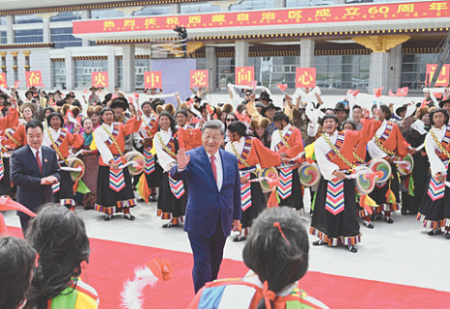
In a significant and highly symbolic visit to Lhasa, Chinese President Xi Jinping has issued a direct call for Tibetan Buddhism to adapt to the tenets of socialism and the directives of the Communist Party. The visit, marking the 60th anniversary of the Tibet Autonomous Region, underscores Beijing’s strategy to intensify its control over the historically restive region and preemptively manage the contentious issue of the Dalai Lama’s succession.
During his trip, Xi was greeted with carefully orchestrated displays of loyalty, including a gala performance in front of the Potala Palace, the former residence of the Dalai Lama. Banners held by attendees echoed the president’s key priorities: ensuring stability, promoting development, protecting the environment, and strengthening border defenses. The messaging signals an unwavering focus on integrating Tibet more firmly into the Chinese state’s political and ideological framework.
The core of Xi’s message, delivered to party officials, was the demand for the “Sinicization” of religion. This directive is a clear challenge to the authority of the current Dalai Lama, who lives in exile in India and remains the paramount spiritual leader for most Tibetans. The issue has gained urgency as the spiritual leader has stated that his reincarnation, or successor, must be found outside of the People’s Republic of China, a move Beijing is determined to prevent.
Beijing rejects the narrative of Tibetan independence, insisting the region has always been an integral part of China. It points to historical precedents, such as the Qing dynasty’s role in approving past Dalai Lama successors, to legitimize its claim to oversee the selection process. Conversely, the Tibetan government-in-exile views the anniversary not as a celebration but as a stark reminder of Chinese occupation. “Tibetans will never accept a plan for the Dalai Lama’s successor designed in Beijing,” stated Dorje Tsetan, a member of the Tibetan parliament in exile.
President Xi’s visit, where he appeared vigorous despite Lhasa’s high altitude, is seen as a powerful assertion of both personal authority and state control. While Xi did not mention the Dalai Lama by name, his directives for stricter regulation of ‘religious affairs’ leave no doubt about Beijing’s intentions. According to Alexander Lukin, a China expert at the Russian Academy of Sciences, specialized party bodies like the United Front Work Department are already tasked with managing the succession issue, which will ultimately require Xi’s approval.
While Beijing can orchestrate elaborate public ceremonies, the fundamental question remains whether its top-down political mandates can supplant the deeply rooted religious faith of the Tibetan people. The visit has brought the simmering conflict over Tibet’s cultural and spiritual future to the forefront of international attention, highlighting the looming struggle over who will determine the next spiritual leader of Tibetan Buddhism.
